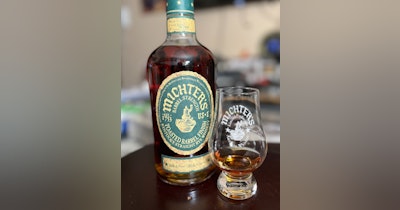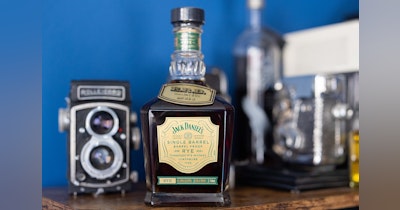Joseph A. Magnus: A Man of Commerce, But Maybe Not Whiskey
The man of commerce
When someone thinks of whiskey, they are drawn to the stories of grandparents in their younger years working at stills, early on fighting “the man” and running their life as they see fit, working hard to bring a product to market that would make them stand out and their name known. A little later, people did become known, when they went legal and started refining their craft, and we get names like Jim Beam. Others made their money in commerce. They didn't create the whiskey, but they did distribute, and brought the art of others to the masses. There is nothing wrong with this way, even if it doesn’t have the same glamor to it. These men of commerce were needed to move whiskey from the stills in the hills to main street USA, they spread the word and created the brands we know and love. They took the story of grandpa moonshiner and created the image of a brand to suite those that they courted as their consumer.
It almost sounds slimy or dishonest, and many feel it is, but to me it's an important part of the market. Grandpa’s hill still whiskey doesn't sound like something you pay for, it sounds like something you trade furs for, so you need one of these people of commerce to take that story and create a brand, something like “old man toms whiskey- made from spring fed mountain water distilled in the family still, passed down for generations” as you can tell, I am not a marketer, but you get the idea.
One of these men of commerce was Joseph A. Magnus. Joseph had a hard early life. His father died when he was six, fighting in the Confederate Army. Saul left behind his wife and 4 children, Joseph being the oldest. The life of Rebecca, Joseph's mom, and the children in these early years is not well known. We do know they moved to Atlanta from Rome, Georgia, and that Joseph began working as a salesman. Based on his quick rise in the liquor trade, it is safe to assume he sold liquor. By 1900, Joseph had married and had 4 children of his own, and was doing well for himself. He had moved to Cincinnati,Ohio and had started Jos A Magnus Co., a wholesale liquor business.
Rectifier and Expert Marketer
Here we should talk about what Wholesale Liquor business means. Wholesale, in liquor and in most other things, is just buying in bulk and reselling for a profit. However, in liquor there were a few other versions of this. One was called “Rectifying”. This was buying different brands and blending them together to create their own blend. Those that were rectifiers didn't age any whiskey, just combined completed whiskeys to get a product that was more consistent and a flavor that they were looking for.
Joseph became good at rectifying and had a bunch of brands, but his most well known and prized brand was Murray Hill Club. This is where I think it is important to highlight Joseph’s marketing skills. No one today can try Murray Hill, and it is important to say that marketing can only go so far to create a lasting brand, so the product must have been good. But the marketing was heavenly. If you go here to the Joseph A Magnus website, you can see newspaper clippings and images from advertisements showing the skill of the marketing department. Here is just one quote from an ad:
“You who love the glorious springtime, Love the dazzling glint of sunshine, Love the Glide along the willows, Deftly Dipping with your paddle, Love the crackling sound of campfire, and to snuggle close to nature, know the murray hill club Whiskey, how its pure delicious goodness, and its rare old mellow richness, fills the heart of man with goodness”
If that doesn't make you want to try Murray Hill Club, I don’t know what would! Joseph was obviously a talented marketer and had to be at least decent at rectifying whiskey, otherwise he wouldn't have been able to continue his company for more than 20 years. In 1918, he saw the writing on the wall, knowing prohibition was around the corner he decided it was time to retire. He would be around 64.
Leaving the Trade
Joseph Leaves Cincinnati around this time and moves to Odin, Michigan, a town in western Michigan along Lake Michigan south of Traverse City. He owns two homes there, but spends his winters In Petoskey at the Petoskey Inn, since they were winterized and set up to deal with the cold harsh winters. He is friends with the mayor of Petoskey, and he donates money to the city and creates Magnus Park. The park is still in the town of Petoskey and there is a nice beach there to enjoy in the summer. I was there over the summer last year and if you are ever on that side of Michigan, which I highly recommend, it is a nice town and a nice beach to visit.
A Legacy Resurfaced
This feels like the end of the story. A history of Murray Hills Club whiskey and the man that brought it to be. But sometimes things from the past and found and resurfaced as something new.
In 2014, a Great Grandson of Joseph Magnus found an unopened bottle of Murray Hill Club. The Grandson wants to try this whiskey, but he wants more than that. Can he lift his great grandfather's name out of the history books and into the 21st century? Can this loved whiskey of the past be recreated? He wants to find out. So he hires a team of experts to run samples on the whiskey and taste and try to recreate this bottle.
After working with these experts to recreate the bottle, they land on a 12 year old MGP whiskey that is triple finished in Oloroso Sherry, Pedro Ximénez, and Cognac casks.
I Have Questions
Before we continue, I have to get a few things off my chest. I was fine with Joseph's name being returned. I think there are many people from that era doing similar things, and I am not convinced he was special in any way, but I can't fault the family for wanting to return him to the conversation, and to be honest, a name like Magnus is too good not to be involved in whiskey. But knowing what we know about rectifying whiskey, and the habits and processes of wholesalers of the time, in what world will their whiskey taste like a 12 year old whiskey finished in Oloroso Sherry, Pedro Ximénez, and Cognac casks? They got the sourcing right at least, but this feels like a bit of a massive stretch to me. I will have more comments at the end, but this story isn't passing the sniff test for me.
Jos. A. Magnus Co. Re Established
In 2015, the Jos. A. Magnus Co. was brought back to life in Washington DC., and they begin selling Joseph Magnus, their recreation of Murray Hill Club. They also offer a Cigar blend which is well known and liked by many.
In 2020, a change occurred and there were some misunderstandings in the whiskey world about ownership of the company. Magnus is owned by an investment firm, Windcrest Group, and they purchased coppercraft Distillery in Holland, Michigan. To continue the legacy of Magnus, they decided to move Magnus to Holland, and produce whiskey there in the Coppercraft Distillery. So Magnus was not sold, Coppercraft was acquired and they moved Magnus to that distillery.
The Magnus Legacy Continues!
Joseph Magnus made his money as an Expert marketer, at least theoretically a good Rectifier, and a man of Commerce. His legacy of selling continues on with the new and improved (Maybe) Joseph A Magnus Co. I want to like this. I want to be happy that a name from the past is resurfacing and getting its due. But I just can’t. If the product was a traditional MGP Product, some blending and basic aging happening by Magnus, and passing that off as a Murray Hill Club copy, I would be okay with that. But passing off a 12 year old whiskey, triple finished in Oloroso Sherry, Pedro Ximénez, and Cognac casks, as a wholesale retailers product from the early 1900’s is too unbelievable. The dishonesty makes me dislike the company in a way that wont allow me to like it.
The Joseph Magnus Bottle we had on the show ( you can listen here) was not something I would try again. The cost was high, probably due to the age and triple finish which I can understand, but it became too complex and unmixed for me. I would try the Cigar blend as I have heard good things about that, but I am going in suspicious.
Joseph Magnus was a great business man, and he should be remembered as such. The new Joseph A. Magnus company is trying to turn a business man into a whiskey man, but I will stick with the original business man. That story is believable.








